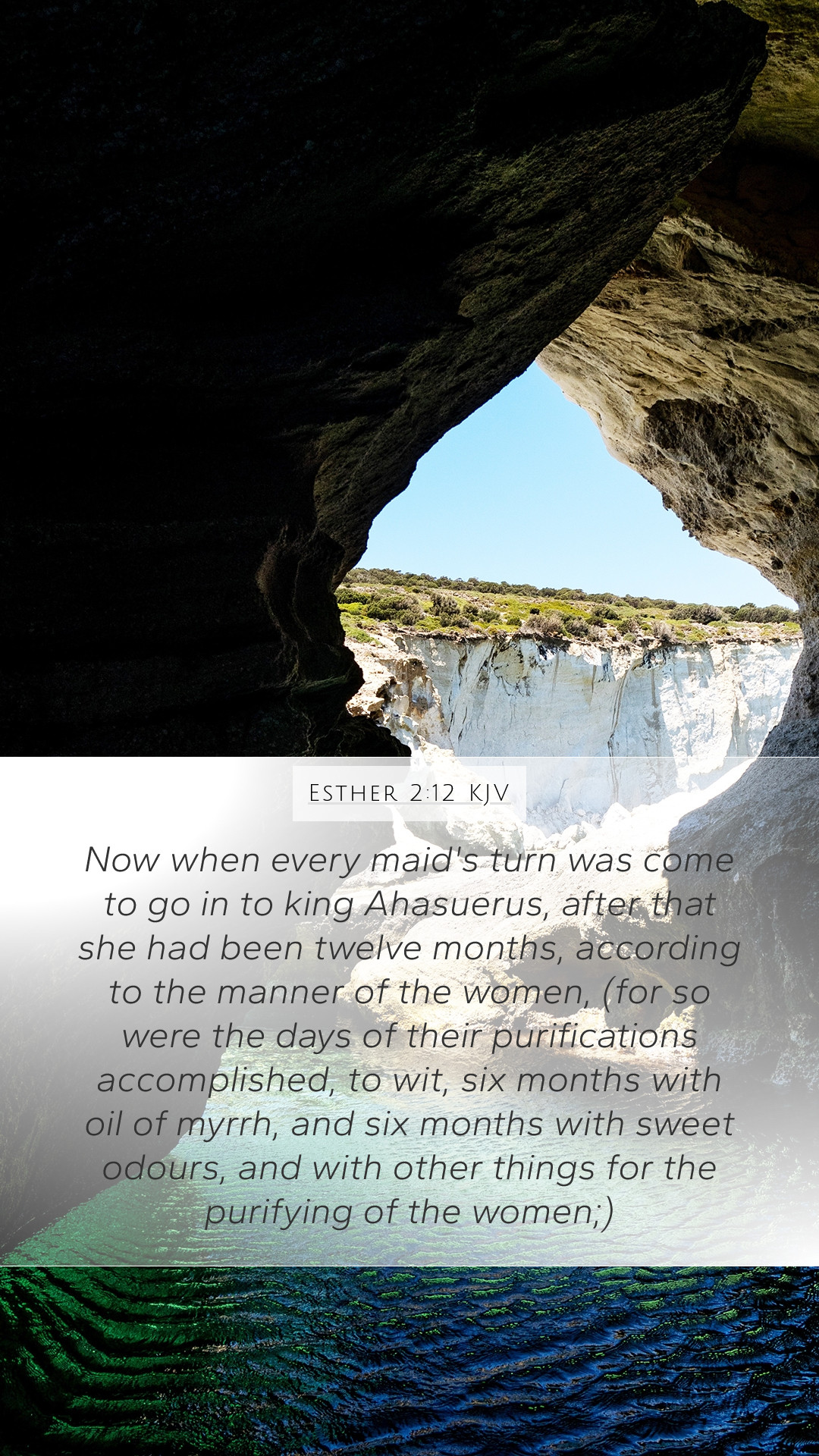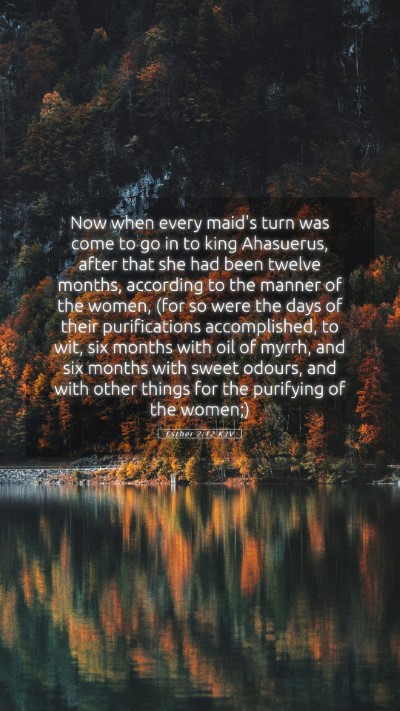Old Testament
Genesis Exodus Leviticus Numbers Deuteronomy Joshua Judges Ruth 1 Samuel 2 Samuel 1 Kings 2 Kings 1 Chronicles 2 Chronicles Ezra Nehemiah Esther Job Psalms Proverbs Ecclesiastes Song of Solomon Isaiah Jeremiah Lamentations Ezekiel Daniel Hosea Joel Amos Obadiah Jonah Micah Nahum Habakkuk Zephaniah Haggai Zechariah MalachiEsther 2:12 Meaning
What is the meaning of Esther 2:12?
Now when every maid's turn was come to go in to king Ahasuerus, after that she had been twelve months, according to the manner of the women, (for so were the days of their purifications accomplished, to wit, six months with oil of myrrh, and six months with sweet odours, and with other things for the purifying of the women;)
Esther 2:12 Bible Verse Meaning
Understanding Esther 2:12
Bible Verse: Esther 2:12
This verse provides significant insight into the preparations and practices involved in the selection of Esther as queen. The verse states: "Now when the turn of each young woman came to go in to King Ahasuerus, after she had been twelve months under the preparations, according to the manner of women, for thus were the days of their purification completed; six months with oil of myrrh, and six months with perfumes and preparations for beautifying women."
Overview of the Passage
Esther 2:12 serves as a pivotal moment in the Book of Esther, showcasing the rigorous beauty treatments that the maidens underwent before presenting themselves to the king. The passage indicates both the physical and emotional preparation required to move from the background to a position of prominence within the royal court.
Literal Interpretation
In a literal context, this verse discusses:
- The significance of beauty and presentation in ancient royal customs.
- The extensive duration of preparation, indicating the value placed on personal appearance.
- The use of specific substances, such as oils and perfumes, indicating the cultural practices regarding hygiene and aesthetics of the time.
Commentary Insights
Matthew Henry's Commentary
Henry explains the essence of this passage as an illustration of God’s providence, which orchestrates the events leading to Esther's rise to queen. He emphasizes that the teachings of the passage extend to recognizing the divine hand at work in the lives of believers, even when circumstances seem trivial or mundane.
Albert Barnes’ Commentary
Barnes highlights the implications of the beauty treatments, suggesting that they were not merely superficial but included elements that allowed the young women to be presented at their best. He notes that this reflects broader themes of preparation and readiness for significant changes in life.
Adam Clarke’s Commentary
Clarke focuses on the customs and cultural practices of the period, explaining the importance of these preparations. He posits that while the outward beauty was emphasized, adornment served a deeper purpose, namely to fulfill the king's expectations and secure a place in his favor.
Spiritual and Theological Significance
This scripture transcends its historical context to reveal important spiritual lessons:
- Preparation for Life’s Challenges: Just as the maidens underwent extensive preparation, individuals in their faith journey are called to prepare themselves for the purposes God has for them.
- God’s Sovereign Plan: The meticulous detail in the selection process underscores that God carefully orchestrates events in believers' lives, guiding them toward their divine calling.
- Beauty Beyond the Surface: While physical beauty is represented, the verse also invites reflection on inner beauty and grace, mirroring the characteristics of a virtuous life.
Application to Daily Life
Esther 2:12 can inspire individuals in the following ways:
- Recognizing the importance of preparation in various aspects of life, whether spiritual, professional, or personal.
- Emphasizing the value of self-care and taking time to develop oneself holistically.
- Understanding that one's background and experiences contribute meaningfully toward future roles and responsibilities.
Related Bible Cross References
- 1 Samuel 16:7 - "But the Lord said to Samuel, 'Do not look at his appearance or at his physical stature, because I have refused him. For the Lord does not see as man sees; for man looks at the outward appearance, but the Lord looks at the heart.'" (This highlights the idea of inner beauty.)
- Proverbs 31:30 - "Charm is deceitful and beauty is passing, but a woman who fears the Lord, she shall be praised." (Emphasizing the value of reverence for God over physical appearance.)
- Esther 4:14 - "For if you remain completely silent at this time, relief and deliverance will arise for the Jews from another place, but you and your father's house will perish. Yet who knows whether you have come to the kingdom for such a time as this?" (Speaking to Esther's divine appointment.)
Conclusion
Esther 2:12 offers layers of meaning that reflect both historical context and teachings relevant to personal faith journeys today. By examining this verse through various commentaries, individuals can gain a deeper understanding of scripture, enriching their Bible study insights and applications in everyday life. This verse invites readers to reflect on their own preparations, inner beauty, and roles within their divine destinies.


